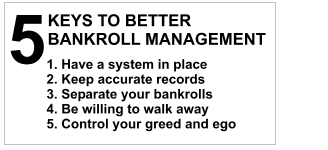Successful Bankroll Management

I play poker for a living, and I’ve had a system that I’ve been using for over 12 years. I play at a certain limit, and if I lose 3 sessions in a row, I go down to the level underneath that I’ve been playing. So if I’ve been playing $40/$80, I’ll go down to $30/$60. And I have to win 3 sessions in that game to get back up to $40/$80. And I’ve gotten all the way down to $3/$6, or even $2/$4, from as high as $200/$400, but it’s a system that works.
Some of it’s a silly superstitious thing; if you’re running bad, you want to play smaller. But also, it prevents you from really going on tilt, it teaches you discipline, and it improves your all round game because you end up playing with a wide range of players, from new to pro.
It’s really important to be organized and keep records. People kid themselves. Have you ever talked to anyone who admits that they lose online? Only about 6% of all players come out ahead online, so you’ve got 94% of the people lying or in denial. You have to keep records, because then you can see our hourly win rate, you can see what games you’re winning at, what games you’re losing at, and you can improve your game by tracking these things. If more people kept track and kept organized, they would be much more successful at gambling – but at the same time, it goes against the whole grain of gambling and the gambler’s mentality to approach it that way.
One key aspect to money management, for me, is having a completely separate bankroll for poker, which you do not touch for anything else. I even have a separate bankroll for tournaments. With live play, I like to have a bankroll way above the usual amount required to play a certain limit. People say for $80/$40, you need a bankroll of $50,000 to $60,000. I think you should actually have double that amount to play that limit. You also need to be careful playing tournaments and be aware of how much you can afford in terms of entry fees. If you want to play all the big ones, it costs well over $250,000 a year. There’s such a short-term luck factor involved with tournaments, that if you’re playing too many, you’re always running the risk of going broke.
 The biggest problem I see among poker players in cash games is that, pardon the expression, they eat little, and s–t big. In other words, when they sit down at a session and they win, they quit right away instead of playing for a while, and that’s when you should play longer. And when they’re stuck, they play for two days.
The biggest problem I see among poker players in cash games is that, pardon the expression, they eat little, and s–t big. In other words, when they sit down at a session and they win, they quit right away instead of playing for a while, and that’s when you should play longer. And when they’re stuck, they play for two days.
In tournaments, there’s a problem in terms of people taking shots. People play the little tournaments, the nooners, the online tournaments, and they build up their money slowly until they have enough to get into a five-dome WPT event. And then, boom, all their money’s gone. Rather than trying to satellite in, they just take a shot. Taking shots is why most people go broke.
Ego is another major problem that gets people into trouble. People aren’t willing to step down to smaller games, because they’re afraid someone will see them. But you can’t worry about keeping up with the Joneses. If the game is good, and you feel good, keep playing. But if you feel intimidated or overmatched, get out. You can always go back the next day. Don’t ever sit in a game where you’re on scared money. If you have to play $5/$10 forever, then that’s what you have to do.
Money management in poker isn’t sexy, but it’s essential to be successful at poker. I know a guy – one of the best players I know – he gets together $50,000, $60,000, $100,000 all the time playing $30/$60, and then he’ll hop into the $300/$600 game and just lose it all in one shot. That’s crazy – it’s a marathon, not a sprint. Don’t let the greed get to you!
![]() For more poker tips from professional players.
For more poker tips from professional players.
![]() For the latest online poker site reviews.
For the latest online poker site reviews.
No Comments so far
Leave a comment
Leave a comment
Line and paragraph breaks automatic, e-mail address never displayed, HTML allowed:
<a href="" title=""> <abbr title=""> <acronym title=""> <b> <blockquote cite=""> <cite> <code> <del datetime=""> <em> <i> <q cite=""> <s> <strike> <strong>